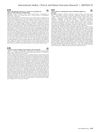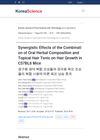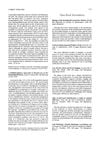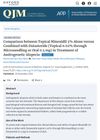 1 citations,
April 2019 in “Journal of Investigative Dermatology”
1 citations,
April 2019 in “Journal of Investigative Dermatology” Oral minoxidil can potentially increase hair growth in people suffering from Central Centrifugal Cicatricial Alopecia.
 1 citations,
April 2018 in “The journal of investigative dermatology/Journal of investigative dermatology”
1 citations,
April 2018 in “The journal of investigative dermatology/Journal of investigative dermatology” Oral tofacitinib significantly improves lichen planopilaris symptoms without adverse effects.
 1 citations,
January 2018 in “Journal of Steroids & Hormonal Science”
1 citations,
January 2018 in “Journal of Steroids & Hormonal Science” Oral vitamin D treatment can help some children with alopecia areata who have vitamin D deficiency.
 1 citations,
June 2017 in “Journal of the American Academy of Dermatology”
1 citations,
June 2017 in “Journal of the American Academy of Dermatology” Oral tofacitinib may be an effective and tolerable treatment for some people with severe alopecia areata.
1 citations,
November 2016 in “Journal of dermatological treatment” Oral tacrolimus may be a potential treatment for hair loss that doesn't respond to corticosteroids.
 1 citations,
April 2012 in “Korean Journal of Food Science and Technology”
1 citations,
April 2012 in “Korean Journal of Food Science and Technology” Using both oral herbal supplements and hair tonic together works better for hair growth than using just the tonic.
 1 citations,
November 2011 in “Open access journal of contraception”
1 citations,
November 2011 in “Open access journal of contraception” Birth control pills with low-dose estrogen and antiandrogenic progestins can effectively treat acne.
1 citations,
March 2005 in “SKINmed/Skinmed” Oral contraceptives can help treat skin issues like acne and excess hair.
 1 citations,
November 2001 in “British Journal of Dermatology”
1 citations,
November 2001 in “British Journal of Dermatology” Oral cyclosporin doesn't stop hair loss.
 1 citations,
May 1999 in “Journal of Oral and Maxillofacial Surgery”
1 citations,
May 1999 in “Journal of Oral and Maxillofacial Surgery” Patients with mandible reconstruction had better quality of life and function than those with soft-tissue reconstruction.
1 citations,
December 1995 in “Archives of Dermatology” The combination of topical minoxidil and oral finasteride improved hair regrowth in a man with advanced hair loss.
1 citations,
March 1995 in “Pharmacoepidemiology and drug safety” Taking oral contraceptives while on isotretinoin may increase the risk of high triglyceride and cholesterol levels.
 November 2024 in “JAMA Dermatology”
November 2024 in “JAMA Dermatology” Low-dose oral minoxidil may help with hair loss, but more research is needed.
November 2024 in “Actas Dermo-Sifiliográficas” Low-dose oral minoxidil can improve hair and eyebrow growth in frontal fibrosing alopecia.
 October 2024 in “International Journal of Dermatology”
October 2024 in “International Journal of Dermatology” Oral and topical minoxidil are equally effective for hair loss, but oral minoxidil causes more unwanted hair growth.

Combining Minoxidil with topical Dutasteride via microneedling is the most effective and safe treatment for hair loss.
 September 2024 in “Journal of the American Academy of Dermatology”
September 2024 in “Journal of the American Academy of Dermatology” Media attention increased oral minoxidil prescriptions for English-preferring patients but not for Spanish-preferring patients.
 September 2024 in “Journal of the American Academy of Dermatology”
September 2024 in “Journal of the American Academy of Dermatology” The New York Times article boosted interest in using low dose oral minoxidil for hair loss.
 September 2024 in “Journal of the American Academy of Dermatology”
September 2024 in “Journal of the American Academy of Dermatology” Experts agree on guidelines for safely using low-dose oral minoxidil to treat hair loss.
 September 2024 in “Journal of the American Academy of Dermatology”
September 2024 in “Journal of the American Academy of Dermatology” Oral minoxidil is easier to use and more satisfying for hair loss treatment but may cause more unwanted hair growth.
 August 2024 in “Pakistan Journal of Health Sciences”
August 2024 in “Pakistan Journal of Health Sciences” PRP with finasteride is better for hair regrowth than minoxidil with finasteride.
August 2024 in “Bioorganic Chemistry” Cedrol from ginger can promote hair growth when taken orally.
 August 2024 in “Skin Research and Technology”
August 2024 in “Skin Research and Technology” Low-dose oral minoxidil can help increase hair growth in women with hair loss.
 July 2024 in “Skin Appendage Disorders”
July 2024 in “Skin Appendage Disorders” The supplement significantly improves hair density and appearance in people with hair loss.
 July 2024 in “The journal of investigative dermatology/Journal of investigative dermatology”
July 2024 in “The journal of investigative dermatology/Journal of investigative dermatology” Using both topical and oral minoxidil does not reduce hair shedding.
 July 2024 in “Journal of Investigative Dermatology”
July 2024 in “Journal of Investigative Dermatology” Most women continued using oral minoxidil for hair loss despite mild to moderate side effects.
 July 2024 in “Journal of the American Academy of Dermatology”
July 2024 in “Journal of the American Academy of Dermatology” Low-dose oral minoxidil is generally safe for hypertensive patients with hair loss.
 June 2024 in “British Journal of Dermatology”
June 2024 in “British Journal of Dermatology” PRP with topical minoxidil is the most effective treatment for increasing hair density in androgenetic alopecia.
 June 2024 in “British Journal of Dermatology”
June 2024 in “British Journal of Dermatology” Combining PRP with topical minoxidil is the most effective for increasing hair density in male pattern baldness.
 June 2024 in “European Journal of Clinical and Experimental Medicine”
June 2024 in “European Journal of Clinical and Experimental Medicine” Oral minoxidil for hair loss can cause weight gain due to fluid retention.
























